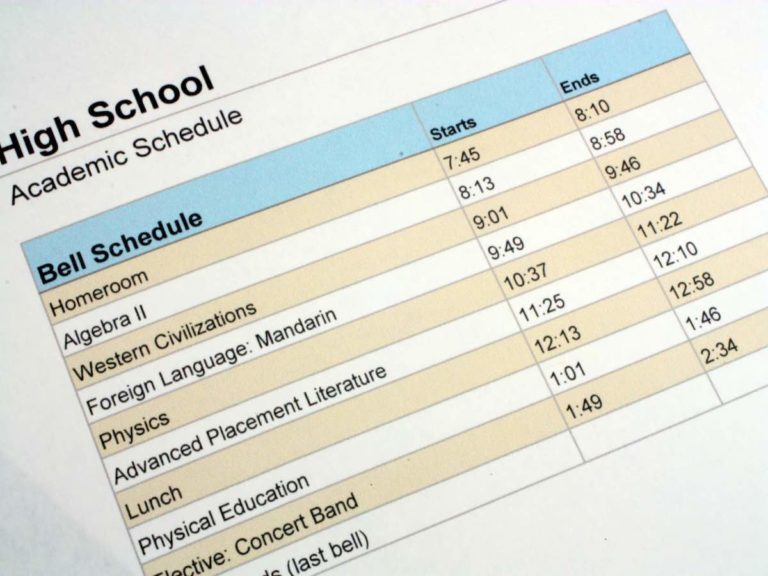Should Foreign Language Be Required in School?
Many high schools offer foreign language courses such as Spanish, French and German and, in some instances, Mandarin and Arabic, too.
There are also AP foreign language classes in many of them.
However, the learning of a foreign does not begin and end in high school — many colleges also require undergraduates to take a certain number of foreign language classes.
Is speaking one language not enough and should learning another language be the norm in an educational setting?
Even though not all students plan on working abroad or having jobs that require bilingualism, they can benefit from foreign language learning. Numerous studies agree that it can improve the mind and lower stress. Also, learning to speak a new language can help with an individual’s college and professional career.
Thinking about taking AP Chinese Language and Culture or AP Spanish Literature and Culture in high school or considering majoring in foreign languages at your top choice college?
Then don’t stop reading now!
Below, I will talk about some of the perks of learning a foreign language. I will also discuss whether or not the likes of Google Translate, ChatGPT, DeepL and iTranslate are going to make foreign language learning a thing of the past.
10 Reasons Why Foreign Language Learning Should Be a Requirement
Let’s kick things off by checking out the many different benefits of learning a foreign language:
Stronger cognitive functioning
Learning a foreign language can help students succeed in their pursuit to learn.
As a report by Knowable Magazine has put it, bilingualism engages areas of the brain that are also responsible for concentrating on a task even when there are distractions.
Due to this, you get to effectively control, direct and manage your attention as well as your ability to plan — or what’s collectively known as the executive function.
Simply put, the executive function consists of tasks that are the most complex of the brain’s functions, which are considered the most “human” functions that separate you from apes and other animals.
It goes without saying that foreign language learning can help you become smarter.
Research published by the Proceedings of the National Academy of Sciences (PNAS) said that bilingual kids were better at solving puzzles compared to their monolingual counterparts.
Enhanced multitasking ability
According to the results of a study reported by Cleveland Clinic, college students who multitask usually take a longer time to do their homework and have lower grades, too.
The website adds that, says a neuropsychologist, the brain is wired to focus on a single task at a time — instead of doing 2 things at a time, the brain switches between them back and forth rapidly.
But another study called Bilingualism as a Model for Multitasking found that the brain creates new pathways when bilinguals switch between 2 different languages, which then helps improve multitasking.
High schoolers and college students have a lot on their plates, sometimes even biting more than they can chew.
It’s true that learning a foreign language can add to their everyday academic tasks. However, considering its ability to improve multitasking, it could be the one they need to ace their educational careers.
Increased decision-making skills
Adults, it is said, make approximately 35,000 remotely conscious decisions each day.
Preparing for your career, believe it or not, is best started in high school.
The extracurricular activities you partake in and the AP courses you take can impact your college admissions chances.
The postsecondary institution of your liking and the people you network with and the opportunities you grab in college, meanwhile, can help shape your future career.
With so many choices to make, it’s therefore a must for you to have superb decision-making skills. It’s a good thing that something as simple as deciding to learn a new language can help you achieve just that.
Lower stress and anxiety
Extracurriculars are there not only to help students pursue their interests and improve their college admissions chances or job market value, depending on their educational level — they’re also around to help with the reduction of stress and burnout, both of which are common among students and can hinder academic success.
Foreign language learning can help deal with those, too.
As a matter of fact, a study on bilingual individuals shows that they have improved self-esteem and a more positive outlook, thus allowing them to experience lower stress levels.
Compared to monolingual people, they are generally happier and less anxious and less depressed.

More career opportunities
Around 61% of all hiring managers agree that knowing at least two languages is getting more and more important in today’s working world.
On the other hand, around 66% of all employers offer incentives to employees to encourage them to learn another language, which is indicative of the importance of bilingualism in the workforce these days.
As a matter of fact, based on a survey conducted by the American Council on the Teaching of Foreign Languages (ACTFL), 9 out of 10 employers count on employers who can speak languages other than English.
There’s no denying that the numbers make it clear that foreign language learning is great for career goal attainment.
Just about any industry could benefit from workers who can speak more than just a single language.
And according to a report by CNN, the following are some of those that need them the most:
- Communication
- Customer service
- Education
- Finance
- Healthcare
- Hospitality
- Law enforcement
- Social services
Better admissions chances to elite colleges
Everyone knows that you have to have a high GPA, remarkable recommendations, standout essays and exciting extracurriculars to boost your chances of getting into some of the most selective postsecondary institutions in the land.
But did you know that proficiency in a foreign language is a must, too?
Competitive colleges and universities typically require applicants to have taken 3-4 years of foreign language classes in high school.
But gaining the know-how of speaking another language doesn’t end with getting admitted — a lot of these top-tier institutions also require undergraduates to take 1 or 2 semesters of foreign language.
Here are just a few elite schools with a foreign language requirement:
- Carleton College
- Georgia Institute of Technology
- Harvard University
- Massachusetts Institute of Technology
- Stanford University
- University of California, Los Angeles
- University of Michigan
- Williams College
Higher SAT and ACT scores
Here’s one more reason why learning a foreign language can help increase a student’s chances of getting an acceptance letter from a selective institution of higher education: it can help improve standardized test results.
According to numerous studies, test-takers with knowledge of a foreign language tend to get higher SAT or ACT scores than their monolingual peers.
This is especially true in areas that matter the most, including reading and writing, and even math. High schoolers taking foreign language classes in their junior and senior year are likelier to get better scores.
These days, plenty of colleges and universities have a test-optional admissions policy.
So, in other words, applicants may or may not report their SAT or ACT scores. But if yours are high, submitting them allows you to show those admissions officers what their campuses could wind up missing should they deny you.
Eligibility for study abroad programs
NAFSA: Association of International Educators says that 14,549 US students were studying abroad for credit during the academic year 2020 to 2021 — 66.3% were studying in Europe, while 12.3% were studying in Asia.
Some of the perks of grabbing study abroad opportunities include:
- Seeing the world
- Increasing job market value
- Exploring new career prospects
- Meeting new friends
- Discovering new cultures
- Learning new languages
And speaking of which, for most study abroad programs, one of the eligibility requirements is having completed a minimum number of years of foreign language classes in high school.
In some instances, interested students also need to have completed a certain number of semesters taking foreign language classes in college.
In any case, foreign language learning is usually a must for you to gain admission to a study abroad program.

Improved networking skills
When learning a foreign language, it’s not just how you speak and process the language of your choosing that you gain — you also learn the cultural heritage of the language.
As a result of this, you can build better relationships with the language’s native speakers.
Multilingual individuals tend to have a different perspective of viewing the world, which enables them to be more appreciative and flexible when it comes to the opinions and actions of others, particularly those from other cultural backgrounds.
Because of this, you get to enjoy improved networking skills, which is especially beneficial for fostering career development.
Most especially if it’s a global career that calls for some serious cross-cultural knowledge and skills, learning a foreign language as you work on your high school diploma or college degree can work to your advantage.
Better understanding of one’s native tongue
Believe it or not, as you get better and better at speaking a foreign language, you also get to improve your English.
Based on a study published by the National Center for Biotechnology Information (NCBI), knowledge of a second language can improve a bilingual’s reading and vocabulary performance in his or her native language.
Learning the mechanics of a second language such as sentence structure, grammar and words — this helps improve your awareness of the language you have been exposed to since birth.
So, in other words, foreign language learning makes it possible for you to learn how to speak a second language and boost the way you speak your first one.
There you go — the 10 reasons why foreign language should be required in school!
But before we wrap things up completely so that you can get started with learning a foreign language, let’s answer this pressing question that may be on your mind but feel too embarrassed to ask…
Will Language Learning Become Obsolete?
Because translation nowadays can be as simple as taking a snapshot or speaking into the phone, college-bound teens who are thinking about majoring in foreign languages may have second thoughts.
Here’s what the future looks like…
As artificial intelligence (AI) continues to advance, translation technology will only become stronger.

According to the US Bureau of Labor Statistics (BLS), as of this writing, translators and interpreters receive a median pay of $23.61 per hour — that’s equivalent to $49,110 per year.
The projected job growth rate for them over the decade, from 2021 to 2031, meanwhile is 20%.
With the average job growth rate for all occupations being 5%, translators and interpreters are at an advantage.
As a matter of fact, BLS adds that approximately 9,200 job openings for interpreters and translators are expected per year, on average, within the same time frame.
However, it doesn’t take into account the fact that various language translation apps and devices are only going to be more and more extensive and more and more cost-effective than hiring a person to do the translating.
Whether or not AI will one day replace foreign language majors, who knows?
But what’s certain as of the time being is that, according to the Modern Language Association (MLA), as reported by Polyglottist Language Academy foreign language instruction in postsecondary institutions has seen a decline starting in 2009.
As a matter of fact, it also states that only 7.5 foreign language enrollments per 100 students actually enrolled in colleges and universities in the country. And it’s not just a phase that may go away but a serious trend that may persist.
Here are the enrollments in foreign language programs per 100 students in the past years:
- 8.1 in 2013
- 9.1 in 2006
- 10+ in the 1960s and 1970s
So, does this mean you should major in anything but foreign languages for a brighter future?
Adding translating and interpreting to your list of career goals may not be the smartest considering the trajectory of translation technology.
But it doesn’t necessarily mean that there will be no more room available for foreign language majors in the future — not all career opportunities available for them can be replaced by machines.
No matter how intelligent AI gets in the future in terms of translating one language to the other, it will still need foundational knowledge vital for it to be able to carry out independent or further thinking.
Such can only come from humans who can speak foreign languages and take into account the following:
- What is the individual trying to say?
- What is the context of the text or message?
- Who would the person be saying it to?
- What emotion does the individual want to convey?
Needless to say, while it’s possible for some industries such as IT, finance and even travel and tourism to have very little need to seek out foreign language majors, other sectors, including especially those that develop translation apps and devices and run websites and other services to detect and translate languages, may still warrant their expertise.
And, as mentioned above and contrary to popular belief, translating and interpreting are not the only career options for individuals with a major or a degree in foreign languages.
Below are some of the jobs that you can get as a foreign language graduate and the median annual salary of each:
| Job | Median Salary |
|---|---|
| Academic researcher | $59,684 per year |
| Content creator | $41,166 per year |
| Copywriter | $69,510 per year |
| Customs officer | $99,751 per year |
| Flight attendant | $61,640 per year |
| Hotel manager | $59,430 per year |
| Human resources specialist | $62,290 per year |
| Immigration paralegal | $56,230 per year |
| Import specialist | $55,327 per year |
| Intelligence analyst | $50,070 per year |
| Investment analyst | $78,936 per year |
| Resort manager | $56,943 per year |
| Sales representative | $62,890 per year |
| Travel agent | $43,810 per year |
Unless machines that can perform any of the above-mentioned jobs completely autonomously come into being anytime from now, winding up unemployed after majoring in foreign languages should be the least of your worries.
And since learning a foreign language is unlikely to become obsolete for job-seeking individuals, it’s something that high school teens may choose to pursue whether it’s their interest or passion or getting admitted to a selective college or university is a part of their bucket list — again, many elite schools prefer students who can demonstrate foreign language proficiency.
Putting educational and professional pursuits aside, there’s one more reason why it’s unlikely for translation technology to eliminate good old translating and interpreting completely: tech can fail.
Sure, there are numerous apps and websites you can fire up each time.
But what if your smartphone dies?
Or what if your trusted app glitches?
Or what about if your headset runs out of juice or gets misplaced?
And what if there’s no internet access?
And it’s not just technological concerns that can get in the way. Being in a noisy environment, speaking quickly, sharing something confidential — the limitations are many!
Relying on a machine can also jeopardize your reputation or the safety of others.
The cost of committing a mistake when, say, translating instructions for patient care or medical equipment use or legal documents or the safe and proper use of hazardous industrial chemicals and household products is simply too high to leave the task to an app or device.
Just Before You Go…
I guess I was able to convince you of the usefulness of learning a foreign language in high school and later in your life; please check the following related topics.
Disclaimer: The views and opinions expressed in this article are those of the authors and do not necessarily represent those of the College Reality Check.





